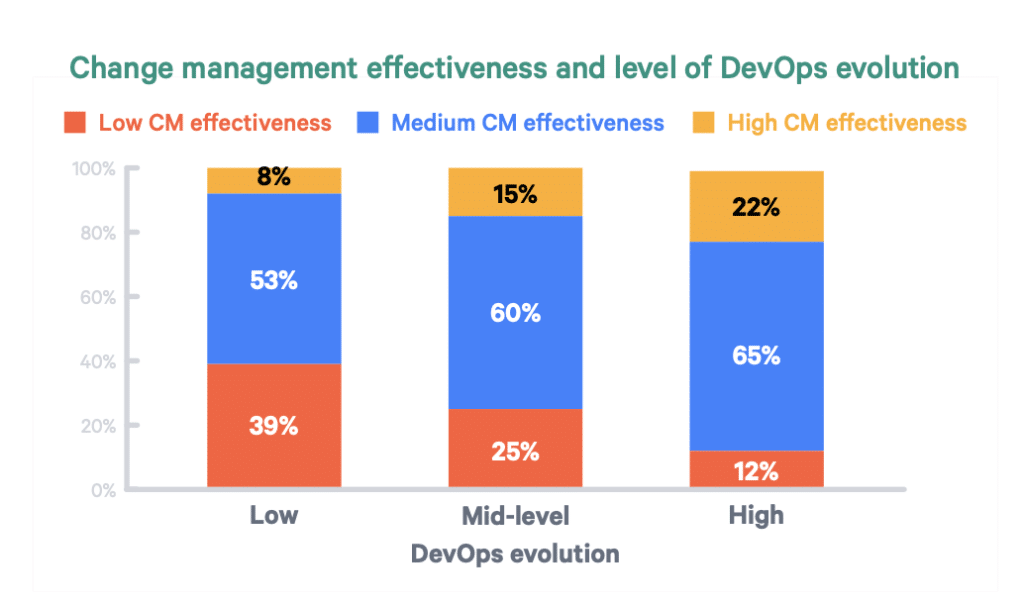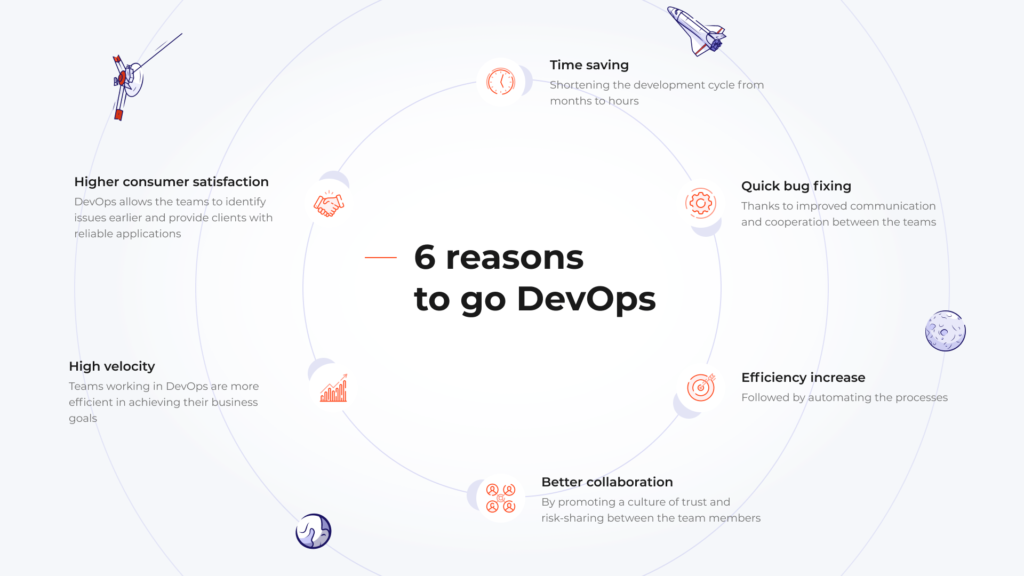6 reasons why you should consider going DevOps

Originally published July 9, 2018, updated December 22, 2020
In traditional organizations, the success of development and operations teams is measured by different results. While the number and quality of delivered updates are essential for developers, operations teams care more about maintaining the health of the system. These two interests remain separate as organizations put teams and the data they generate in silos. In reality, organizations need to both deliver new features and maintain stability. And that’s where DevOps comes in. In this article, we’ll briefly describe what DevOps is and what are the top 6 benefits of implementing it in your company.
What is DevOps?
DevOps, a term formed by combining the words “development” and “operations”, is a mix of tools and practices made to increase the organization’s ability to deliver products smoother, quicker, and preferably bug-free.
Gartner describes DevOps as a method that:
represents a change in IT culture, focusing on rapid IT service delivery through the adoption of agile, lean practices in the context of a system-oriented approach. DevOps emphasizes people (and culture), and it seeks to improve collaboration between operations and development teams.
The DevOps approach is based on:
- Continuous Integration, helping to detect any issues appearing during the stage of coding,
- Automatic Testing, allowing to fix bugs detected at an earlier stage, without time-consuming manual testing,
- Continuous Deployment, enabling automatic installations of changes in the environment.
In a DevOps environment, teams can share code bases, benefit from continuous integration, and take advantage of automatic deploys to expose problems early on in the development process. That just can’t happen in traditional organizations where the code is taken over to operations teams at the end of the coding process.
DevOps brings plenty of tangible benefits to organizations. In their State of DevOps Report, Puppet revealed that high-performing DevOps organizations see:
- 200 x more frequent deploys
- 24 x faster recovery times
- 3 x lower change failure rates
than companies that haven’t implemented DevOps culture.
Here are 6 reasons why you should consider implementing DevOps at your organization.
Technical benefits
Time saving
Since DevOps is all about increasing collaboration between development and operations teams, it directly translates into shorter development cycle time by increasing the frequency of releasing code into production.
Traditional organizations take from 3 to 6 months to bring a product from requirements to release. By introducing DevOps, the same cycle can be reduced into a daily or even hourly release-build cycle. That type of continuous development and deployment builds a competitive advantage for businesses, increasing the value of IT to the organization. The State of DevOps Report from 2019 found that teams working in DevOps deploy 208 times more frequently and 106 times faster than low-performing teams.
Quick Bug Fixing
Handling bugs in DevOps can be fast because of improved communication and cooperation between various types of departments. When all parties are engaged to find the issue source, the whole process is inevitably quicker. Also, by following the Continuous Integration approach, a team is making smaller code changer more frequently. They are also testing continuously using automatic methods and tools, which helps them keep the code “green” (defect-free).
Culture benefits
Efficiency increase
As the State of DevOps 2020 Report shows, change management effectiveness is strongly correlated with the DevOps evolution. An increase in efficiency within a team is a perfect example. The respondents concluded that the change management effectiveness was constantly increasing as the DevOps implementation in a company was progressing. In the case of the companies at an early stage, their Change Management Efficiency was as follows: 39% – low, 53% – medium, 8% – high. In comparison, the organizations at the advanced level of revolution record efficiency at the following levels: 12% – low, 65% – medium, and 22% – high.

What’s more, the survey confirmed that change management effectiveness increases when employees have more input and influence on the process. Employee involvement plays a big role: companies with high employee involvement in the change management process are more than five times as likely to have highly effective change management than firms with low employee involvement.
Better collaboration
Another area where DevOps brings serious benefits is the company culture. The increased communication and collaboration between development and operations teams means that they’re no longer siloed and can communicate with one another freely, sharing knowledge and best practices to build a robust process.
The agile methodology is at the backbone of DevOps. By boosting collaboration, fostering iterative development, modular programming, and breaking large code bases into smaller chunks, DevOps is an approach that makes the lives of development and operations teams easier.
DevOps promotes a culture of trust and risk-sharing between team members. It encourages teams to continuously experiment with the aim of improving the company’s products and services. That way, both development and operations teams are enabled to research new customer needs and develop innovations to address them.
Finally, DevOps introduces a durable quality to the company culture: performance. Instead of traditional rule-based or power-based cultures, DevOps aims to reduce the bureaucracy that is part of the process, leading to a happier, more satisfied, and, therefore, more productive workforce. And that translates directly into the organization’s business performance.
Business benefits
High velocity
One of the most important benefits of the DevOps model is its high velocity. Companies gain a competitive advantage by being able to adapt to changing markets, innovate faster, and become more efficient in achieving their business goals. Since DevOps is based on lean principles, reduction of waste is critical to any DevOps implementation.
The customer of psl corp, a global geolocation company with offices in the US and Europe, found out about many advantages of switching to DevOps. Their goal was to expand the reach of location services worldwide, and adopting to DevOps was the solution. Thanks to the implementation of DevOps culture and leveraging automation tools (such as AWS, Git, and Docker), the team managed to quickly identify bottlenecks. The effects? 50% reduction in deployment time, 30% reduction in infrastructure costs, and 30-40% less time in CI/CD pipeline.
Higher customer satisfaction
As expected, DevOps brings plenty of business benefits to organizations. Let’s not forget that the primary goal of DevOps is providing end-users with high-quality software and excellent experience. The main idea is for organizations to become more efficient and agile in delivering that. At the end of the day, DevOps helps to create a more meaningful relationship with customers by providing them with reliable applications, faster. Thanks to full transparency, DevOps allows the teams to identify issues earlier, and, thus, prevent bugs from going through the development stage and appearing in the final product.
Key takeaway
DevOps is an approach that comes in handy to organizations that want to become more agile through continuous delivery of products and services that match the needs and preferences of end-users. DevOps brings teams many different benefits – some of which are more tangible than others but all have a positive impact on the work of development and operations teams.
Organizations interested in implementing DevOps strategies should start by looking into the tools that enable development and operations teams to communicate and collaborate efficiently.



